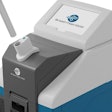Dear LabPulse.com member,
Testing by or near the patient was in the news this week.
A diagnostic study conducted at various Mayo Clinic locations during the first quarantine period of the COVID-19 pandemic in the U.S. has revealed that video telemedicine was highly effective in providing accurate diagnoses of patients. In a 90-day period from late March to late June 2020, nearly 2400 patients who underwent a video telemedicine consultation had their diagnosis match an in-person reference standard diagnosis in 86.9% of cases.
During the pandemic, we've also become more familiar with infectious disease tests that are completed from start to finish at home. With flu season approaching, Cue Health announced it has applied for de novo clearance to the U.S. Food and Drug Administration for its Cue Flu Molecular Test. Clearance would permit the test to be used at home and elsewhere at the point of care.
Meanwhile, AACC recently issued new guidance with expert recommendations for performing point-of-care tests for fertility and reproductive health. The guidance is intended to ensure that patients and their babies fully benefit from testing.
Many industry observers believe the detection of sexually transmitted diseases holds significant potential for point-of-care testing, given the level of privacy that such testing entails. This week, Chembio Diagnostics announced it has received an award of $3.2 million from the Centers for Disease Control and Prevention (CDC) for the development and validation of a point-of-care diagnostic test for active syphilis.
Studies
Among the studies of interest this week, we reported on a general marker of damage to neurons, NfL, which has been used to measure or monitor the severity of several neurologic diseases, including Alzheimer's disease and multiple sclerosis. According to research published in JAMA Oncology, a blood test using the marker that is administered prior to CAR-T cell treatment may identify which patients are predisposed to developing neurotoxic side effects in the days and weeks after therapy.
Meanwhile, researchers at the National Institutes of Health (NIH) have found that a new blood test that measures DNA fragments shed by damaged cells can be used to evaluate disease severity in patients with pulmonary arterial hypertension (PAH), a rare, life-threatening condition.
Two studies involving European sexual health clinics provide evidence that some monkeypox virus infections may be asymptomatic. One of the studies, published in Nature Medicine, included 224 patient samples and discovered that three of four men with positive monkeypox virus test results reported that they were asymptomatic at the time of testing.
Cancer diagnostics
In cancer diagnostics news this past week, BioAffinity Technologies announced it began trading on the Nasdaq on September 1. The San Antonio-based company is a developer of early-stage diagnostic tests for detecting cancer and diseases of the lung and is researching targeted therapies to treat cancer. Its first product, CyPath Lung, uses sputum samples for the detection of early-stage lung cancer in high-risk individuals.
Further, Freenome announced the launch of a study of its multiomics platform combined with real-world data to detect multiple cancers. The Sanderson Study will generate evidence of clinical validation for certain high- and elevated-risk populations while refining the platform's cancer classification and risk prediction models.
Looking ahead, with the European Society for Medical Oncology (ESMO) Congress occurring in Paris from September 9 through September 13, companies developing cancer diagnostic tests have begun announcing abstracts. Guardant Health said on Tuesday that it will present seven research abstracts at ESMO, describing how its blood tests are utilized in cancer therapy trials for predicting and monitoring treatment response, and for identifying the genomic mechanisms of acquired resistance in cancer therapy.
Keep an eye out for similar announcements related to ESMO on LabPulse.com this coming week, from diagnostic industry players such as Foundation Medicine, Illumina, and others.











